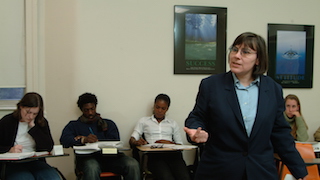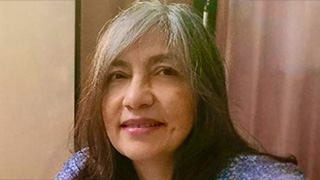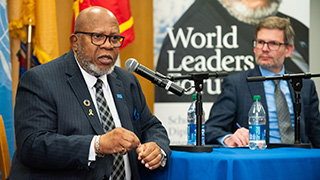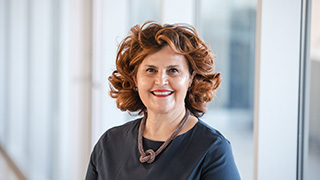Russia Expert and Diplomacy Professor Margarita Balmaceda Featured in NJ.com, Vox and More
Friday, January 28, 2022

In addition to her tenure at Seton Hall as a Professor of Diplomacy and International Relations, Balmaceda is an Associate of the Davis Center for Russian and Eurasian Studies and of the Ukrainian Research Institute at Harvard University.
With Russian troops massing on the border of Ukraine, Professor Balmaceda was called upon by the media to offer her expertise on the subject.
The NJ.com feature is a Q&A with Professor Balmaceda and is entitled "Is the US Headed for Another War? We Asked an Expert in Diplomacy, Putinism and Ukraine."
NJ.com writes:
As the United States and its NATO allies prepare to deploy troops and military hardware, it helps to get a better understanding of Putin's motives and worldview. To get the broad strokes, we turned to Dr. Margarita M. Balmaceda, a professor of diplomacy and international relations at Seton Hall, who has done field work throughout the former USSR and has written four books about energy and politics in the former Soviet Union.
Q. What do Westerners need to know about the history of the dispute between Russia
and Ukraine?
A. The first thing is, Russia has already invaded Ukraine --in 2014 – and today it currently occupies about 7% of Ukraine. But already for many decades,
as a republic of the Soviet Union between 1921 and 1991, Ukraine was very seriously
stifled in its cultural self-expression by the central Soviet state in Moscow. And,
even before that, during the czarist period, Ukraine was subject to harsh cultural
policies. So Russian aggression didn't start yesterday. It’s been going on for a very
long time.
Q. So with talks at an impasse, and assuming that Vladimir Putin isn't turning his
armies around, how will this turn out? Are we going to be involved in yet another
war?
A. The only person who can make that decision is Putin. He's a master of bluff, so
it's possible that he may be tremendously enjoying our fear that he may engage in
a large-scale invasion. But only he can make that decision, and it's not clear how
this will end.
Read more of the Q & A in the article, "Is the US Headed for Another War? We Asked an Expert in Diplomacy, Putinism and Ukraine."
In Vox, Professor Balmaceda was called upon for her expertise on energy and politics and the politics of energy in the former Soviet Union. Since 2000 Balmaceda has been "following the pipeline" – i.e. following the complex web of interconnections that accompany the energy relationship between Russian oil and gas producers, post-Soviet transit states, and European consumers.
The Vox article, "The Pipeline at the Center of Geopolitical Drama," poses the presence of a natural gas pipeline under construction as a "low-key wild card: in the diplomatic mix." Vox writes:
In this frightening morass, there's one low-key wild card: a long-running energy infrastructure project that some consider an economic project, others consider a geopolitical tool of Russia, and that is a combination of all of those and more.
The project in question is Nord Stream 2, an $11 billion Russian-owned pipeline that has Washington in a difficult position with some of its European allies, divided other European countries among themselves, and weakened Ukraine.
When it's up and running, Nord Stream 2 will bring natural gas from Russia to Europe. It is laid alongside Nord Stream 1, which flows from Russia along the Baltic Sea and directly into Germany. Experts said the pipeline will not dramatically increase Russian natural gas imports to Europe, but it could reroute it — meaning more natural gas will flow directly to Germany and potentially bypass other existing pipelines that run through other European countries. Most significantly, Ukraine.
On the prospect of this newest energy pipeline bypassing the Ukraine, Professor Balmaceda notes: "Taking Ukraine out of the transit equation further marginalizes Ukraine from an already pretty marginal role in the European consciousness."
As to whether or not the pipeline is a "geopolitical tool" or a commercial project is a matter of contention among the world’s powers. Germany, which stands to benefit from the pipeline under construction, is said to have "defended Nord Stream 2 as a 'commercial project,' essential for Germany's all-important industrial sector. As experts said at the time and still say today, sure, it's a commercial project, but anything involving a Russian state-owned gas company is going to inherently be political."
Vox further notes:
Germany also looks at Russia through a slightly different lens and has a strong legacy of engagement with Russia, said Meister of the German Council of Foreign Relations. Berlin has traditionally tried to balance its commitments to Western allies with this desire to have productive relations with Moscow, and it often sees business and economic interests as a good venue for cooperation. Germany has relied on Russian gas for decades, and so Germany sees this project as a reliable and practical bet.
The idea that this is a "commercial project" isn't meaningless. Some European companies and other interests have a lot to gain from the pipeline — or lose, if the project is killed, especially at this late stage. One reason the pipeline proceeded despite objections was "the power of those economic groups that are benefiting from this, and I think that power is gigantic," said Margarita Balmaceda, professor of diplomacy and international relations at Seton Hall University and author of Russian Energy Chains: The Remaking of Technopolitics from Siberia to Ukraine to the European Union.
Read more in Vox about "The Pipeline at the Center of Geopolitical Drama."
You can see the feature interview with Professor Balmaceda on the prospect of war in Ukraine with Russia on the Turkish Radio and Television Corporation (in English), "Poland's Foreign Minister Says Europe Closest to War in 30 years."
Categories: Nation and World





